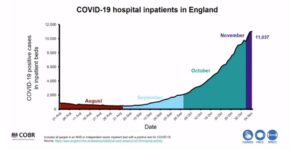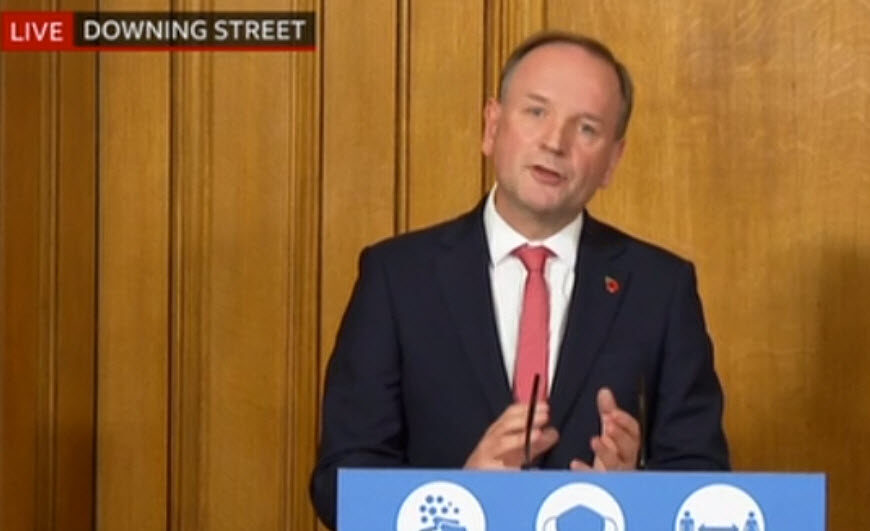NHS England boss Sir Simon Stevens has been wheeled in to help justify the belated government lockdown to stem the rising tide of Covid-19 infection, pointing to the dramatic escalation of numbers hospitalised with Covid to 11,000 (“equivalent to 22 hospitals full of Covid patients”).
Something had to be done. Johnson’s “three tier” approach of local lockdowns, coupled with the shambolic failure of the privatised test and trace system was losing control as the virus was spreading from the North West and Yorkshire.
However NHS England has also seized the opportunity to take back centralised control over England’s NHS. This eliminates any vestiges of local accountability, but also brings a further extension of the information blackout that has fuelled the cranky right wing politicians and columnists who oppose the lockdown.
For example one so-called “Science Editor,” quoting “a leaked document” claimed on November 3: “Hospital intensive care is no busier than normal for most trusts. … Covid-19 patients are accounting for around 10% of general and acute beds in hospitals, but there are still more than 13,000 beds available.”
The argument is cynical and misleading. It manages not only to dismiss the mounting death toll (2000 have died in the past week, equivalent to ten major air crashes) and ignore the crisis in those hospitals that are dealing with higher numbers of Covid patients than the first peak in the spring: it also implies that all 13,000 beds theoretically available across England are accessible from anywhere – as if patients from Yorkshire could be treated in Surrey.
Covid outbreaks have been geographically concentrated, and don’t properly show up in national aggregate data. The problem is that as long as the full figures – compiled daily by NHS England, but kept tightly under wraps – are concealed, it is much harder to reveal the scale of the problem across the NHS.
The HSJ on November 2 also quoted from (the same) leaked figures to point out that “There are 70% more people in hospital now than when England was approaching its spring Covid-19 peak, and twice as many non-covid patients.” The Independent on November 3 also quoted leaked figures showing covid admissions had increased 60% in just 10 days.
 NHS Providers chief executive Chris Hopson on Twitter also argues actual NHS acute bed capacity has been reduced by 10-30% by the need to separate covid from non-covid patients. There are 80,000 NHS staff vacancies and higher rates of sickness absence.
NHS Providers chief executive Chris Hopson on Twitter also argues actual NHS acute bed capacity has been reduced by 10-30% by the need to separate covid from non-covid patients. There are 80,000 NHS staff vacancies and higher rates of sickness absence.
Hopson warns of the “clear risk of a perfect storm” involving a full blown second covid surge, usual winter pressures” as well as work to reduce backlogs in elective treatment. Daily admissions of covid patients are higher than March 23 when the first lockdown was imposed.
The Nightingale Hospitals, supposedly offering extra capacity, could only be used by diverting large numbers of vital staff from already over-stretched NHs hospitals.
Even prior to Covid-19 an NHS starved of resources by ten years of effectively frozen real terms funding was struggling to cope with each winter. In the spring the NHS only “coped” by emptying up to 30,000 beds and cancelling outpatient and elective work, while A&E caseload fell as even patients with serious illness were scared off by fears of catching the virus.
Now, after the government ignored the calls from its own scientific advisors for a pre-emptive two-week “circuit-breaker” lockdown across the half term holidays, ministers have at last recognised that an NHS with fewer beds, exhausted staff, care homes still locked in crisis, looming winter and the virus untracked and out of control would not cope without a lockdown.
The case for it is clear: the argument for it would be so much easier with full and open disclosure of the facts.
Dear Reader,
If you like our content please support our campaigning journalism to protect health care for all.
Our goal is to inform people, hold our politicians to account and help to build change through evidence based ideas.
Everyone should have access to comprehensive healthcare, but our NHS needs support. You can help us to continue to counter bad policy, battle neglect of the NHS and correct dangerous mis-infomation.
Supporters of the NHS are crucial in sustaining our health service and with your help we will be able to engage more people in securing its future.
Please donate to help support our campaigning NHS research and journalism.


